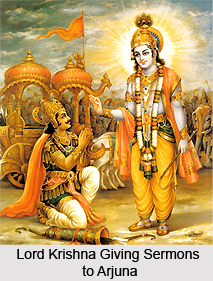 Dharma is the essence of truth and is indeed that eternal factor of strength and force by which human qualities develop in an individual. Dharma makes the action of the individual pure and pious whilst elevating the qualities of humanity and social awareness in an individual. Dharma inspires a person to possess and practice those virtues and values, which eventually make him a good human being.
Dharma is the essence of truth and is indeed that eternal factor of strength and force by which human qualities develop in an individual. Dharma makes the action of the individual pure and pious whilst elevating the qualities of humanity and social awareness in an individual. Dharma inspires a person to possess and practice those virtues and values, which eventually make him a good human being.
Origin of Dharma
The word "Dharma" originates from the Sanskrit root "Dhri", implying that which holds or preserve and maintains the order of the Universe. Establishment of order, security and peace, through the cultivation of virtues is the aim of religion or Dharma. So spreading the mantra of goodness is symbolically referred as Dharma. Truth is one as it is said, "ekam sad". However "ekam sad" or that one eternal truth can be expressed in many ways (vipraa bahudhaa vadanti). Similarly, Dharma is one but is propagated to mankind through various religions. Dharma is thus the substantive form of every religion.
Meaning of Dharma
Time and time again different religious scripture has defined the true meaning of Dharma. Dharma or religion as described in different scriptures is the innate, instinctive and universal laws. The observance of these laws enables humans to be contented and happy. Dharma supports in saving human being from ruin and suffering whilst lifting them up from the abyss of eternal despair. Dharma is the moral law, combined with spiritual discipline that guides one`s life. The compliance of dharma is a prerequisite to enjoy happiness and freedom in personal life; equality and harmony in social life.
Significance of Dharma
The relevance of dharma on the personal level lies deeply in the welfare and happiness of an individual. It is deeply seated in his liberation from illusion, Maya or mental impurities whilst finally helping him in attaining a state of salvation or mukti. This is the state of pure bliss. Dharma purifies one`s consciousness and sublimates the human instincts whilst imparting feelings of compassion and affinity towards other beings.
Dharma in Society
Dharma on the social level however, means the act of establishing those social conditions that are essential for peace, goodwill, freedom, equality, progress and development of the society. The Vedic seers laid the foundation stone for harmonious social life. Sam gachchhadhvam Sam vadadhvam sam vo manaansi jaanataam (You go together, speak together, let your minds think together) and dharma further establishes this whilst strengthening the social bond.
Dharma in Hinduism
Dharma in Hinduism is based on the "deeds" or "Karma" which decides the Karma-Phala or consequences. In Hinduism, the religious and moral law governing individual and group conduct is called Dharma. "The self-controlled person, moving among objects, with his senses free from attachment and malevolence and brought under his own control, attains tranquillity" says Bhagavad Gita. This stirring statement of Bhagavad Gita points out the fundamental dogma of Hinduism. Bhagavad Gita asserts this eternal truth of life, in the prophetic voice of the divine delegation or avatar of Mahavishnu, Sri Krishna.
Dharma in Buddhism
Dharma in Buddhism most often means the body of teachings elaborated by Lord Buddha. The status of the Dharma in Buddhism is therefore regarded as an ultimate truth, or as the font of all things which lies beyond the three realms of life.
Dharma in Sikhism
Dharma in Sikhism is regarded as a distinct religion revealed through the teachings of ten Gurus where the primary objective is to seek union with God and hence, liberation from the cycle of births and deaths.
Dharma in Jainism
"Vatthu sahavo dhammo", dharma is the nature of an object-this very truth finds a divine dimension amidst the Jain concept of dharma. Dharma in Jainism is the nature of the soul to be free. Hence, for the soul according to the Jains the dharma is "ia paralaukika" which ideally means beyond worldly.
Be it any religion, the objective of Dharma is to inspire people to live a virtuous life, in order to achieve the enlightenment of the ultimate truth, and to simultaneously enjoy the bliss of ecstasy. Dharma or religion is the strength and force by which human qualities develop in an individual. Dharma makes the action of the individual pure and pious.



















